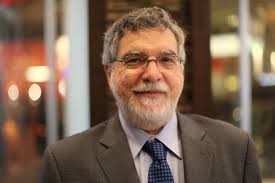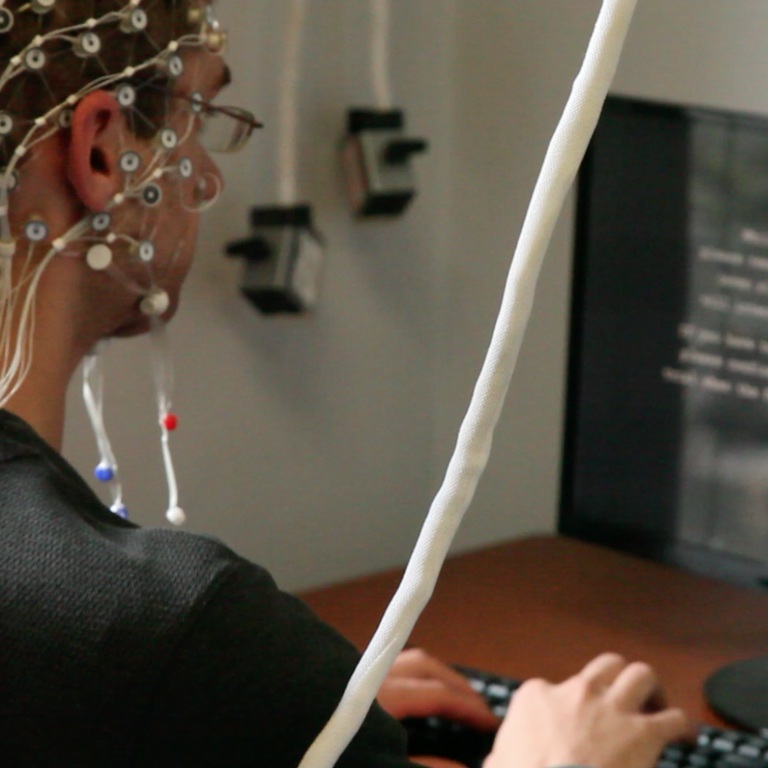Howard C. Nusbaum is a Professor of Psychology at the University of Chicago. As a cognitive psychologist and cognitive neuroscientist, his research interest in wisdom expands to learning, attention, working memory, categorization, consolidation, and language. Dr. Nusbaum has received numerous awards including University of Chicago Future Faculty Mentorship Award and the Quantrell award in Excellence for Undergraduate Teaching. He recently combined his passion for teaching and interest in wisdom through the development of an undergraduate course in the fall of 2014 on Understanding Wisdom. Dr. Nusbaum, along with two other faculty members, Anne Henly and Berthold Hoeckner, tackled challenging psychological and philosophical issues in the academic study of wisdom from Aristotelian perspective to psychometric measures of wisdom.
The following is an excerpt from the documentary film The Science of Wisdom. In this interview, Dr. Nusbaum discusses ongoing research, foundations for wisdom, and the practical benefits to the study of wisdom.
Jean: As a cognitive psychologist, how did you come to study wisdom?
Dr. Nusbaum: My interest in wisdom started in college with an interest in psychology and the notion that experiences change us and how those experiences change us. My work for a number of decades has really been on perception, attention, and learning. Those things seemed to come together in a certain kind of way. I heard a talk by Bob Sternberg about wisdom and leadership and foolishness,…[and] I always was interested in Sternberg's approach to intelligence, which is to ask questions about how different testing environments change intelligence and how different states change intelligence. When I heard him talking about wisdom, I was persuaded that maybe this is what people ought to be thinking about rather than thinking about intelligence per se. I thought his perspective on wisdom as a kind of balanced judgment was interesting because it applies to a more aspirational view of what we would want for psychology. Since it involves aspects of learning from experience and it involves aspects of expectations about the world as well as a willingness to be skeptical about your expectations, it seemed like a nexus of some of the problems that I was interested in from perception transported into more broad issues in psychology.
Jean: Would you describe some of the wisdom research that is going on at the University of Chicago?
Dr. Nusbaum: The wisdom research that we're doing in the lab focuses on a few different topics. One set of problems that we're concerned with is how practice changes your view of the world. This is work that Berthold Hoeckner is leading. The research has looked at things like how practice in meditation or more embodied practices like Alexander technique or Feldenkrais might change something like wisdom. We are interested in how these kinds of disciplines when carried out for a long period of time change the way you make decisions and reflect about the world. Another area of research has to do with insight. The kinds of solutions that people come up with in problems that seem like wise solutions aren't always those that seem to occur from standard rational deductive processes. They seem to involve some aspect of insight. So trying to understand insight and cognitive creativity is another part of the problem. Work that Ali Hortacsu, John List, and I are collaborating on involves economic decision making and how expertise, practice, and experience may change biases in decision processes. Other kinds of work focuses on language. Research that Ann Henly and Clark Gilpin are working on is concerned with figurative language and metaphor, and how that might allow insights into problems in certain kinds of ways and how it forms social connections. So the work that goes on in the lab that I have some contact with spans everything from economic decisions to the effects of practice and learning to cognitive creativity and the effects of language.
Jean: What have you learned from the research so far?
Dr. Nusbaum: When I started looking at wisdom research, the appearance of wisdom research seemed to be hard to get a handle on… one of the ways that I have come to think about it is that wisdom research has focused on descriptions rather than explanations. That [statement] would be arguable. Other researchers like Staudinger and Glück would probably argue against that. Monika Ardelt would argue against that. Sternberg would argue against that. They all have a kind of “process perspective” on what they're doing. Yet those theories seem to derive from a kind of description of what a wise action or person or decision is like. The work that we have been doing has been focused more on what wisdom contributes to expertise or how wisdom might change as a function of experiences. And because of that, I think that the most important aspect of our work has been to suggest more strongly that wisdom is something that is mutable…that is not a function of just age, but that people who engage in certain kinds of activities, regularly practice certain kinds of things, or have certain kinds of experiences can increase in wisdom. … it's a kind of change in perspective that's a consequence of the research…to think that one can become a little wiser rather than having to become wise. Age is not necessarily the determinant of wisdom but experience is. We start asking two kinds of questions: 1) What are the antecedents of wisdom? In other words, what things need to be available to a person or are true about a person in psychology that enables them to develop in a way that increases wisdom? 2) What are the experiences that can lead to that? I think those are … the most important aspects of the work that we've been doing.
Jean: Have you been able to identify any antecedents or foundations of wisdom that could help people become a bit wiser in their everyday lives?
Dr. Nusbaum: I think one of the most important things that I've been thinking about in terms of wisdom- that has been discussed in the class Berthold Hoeckner, Ann Henly, and I just taught called "Understanding Wisdom"- is epistemic humility.
So we often sort of colloquially think about humility as being humble, "Oh, I'm self-effacing. I'm really not all that good." Epistemic humility is something that's been talked about in relationship to wisdom, but I think it's an antecedent of wisdom. What it means is to sort of right-size your sense of your own knowledge. It's not to be derogating your own knowledge, but to understand how much you do know and how much you don't know. Sir John Templeton talked about humility as being important in terms of how little we know and how much we need to know. Epistemic humility - the ability to recognize that you only have a piece of knowledge and how big that piece is relative to how much there is to know- allows you to do things like appreciate other people's perspective. It’s not to make guesses about what other people know, but to try to find out about what other people know. That's at the core of things like the Baltes’ Berlin Paradigm.
Things like value relativism, the appreciation of different people's values as having importance in their lives and importance for their decisions and processing of information… Value relativism is, in fact, I think a consequence of epistemic humility. The ability to ask questions and seek information, is a consequence of epistemic humility. The ability not to pre-judge an experience, but to derive from it new perspectives, I think derives from epistemic humility. So I think epistemic humility is one of those foundations.
People have talked about perseverance and grit, and something related to those is another one of these kind of foundational aspects. A former colleague, Jim Stigler at UCLA talked about intellectual struggle. It’s the willingness to engage in intellectual struggle. I think that a foundation of wisdom is the willingness to engae in intellectual struggle. I'm not sure that is perseverance, and I'm not sure that is grit. I think that a person who is wise has to not shy away from the tough problems. Indeed, a lot of people will look at an experience and take it at surface value…instead of trying to reflect on it and connect it to other things in their lives or connect it more broadly. I think the willingness to engage in intellectual struggle - to stick with a problem that's hard and think about it - that's another one of these foundations.
Reflection and the ability to reflect is part of Valerie Tiberius' theory of wisdom (which I think is a brilliant perspective on wisdom in terms of processing). Reflection is important. We don't know what reflection really is scientifically.
Another foundation is the notion of being able to engage in a mental self-examination in a perspectival framework, to think about other people's perspectives, to relate those kinds of perspectives to your perspective, and to think about a problem in other people's terms. Also, some aspect of cognitive creativity in some form [is also a foundation].
Those (epistemic humility, value relativism, intellectual struggle, reflection, perspective taking, and creativity) are the things that need to be in place in order to take best advantage of an experience and grow a little bit wiser from those experiences.
Jean: Considering broader, real-world perspectives, and not in academia, what are some of the benefits to the study of wisdom?
Dr. Nusbaum: That's an interesting question. I went to China to give a talk to the China Wisdom Engineering Association. I met a number of middle school teachers and principals who all want to increase wisdom in the educational process or increase the educational support for the development of wisdom. Perhaps a better way to put it is that they were… grappling with these problems for two kinds of reasons that were narrowly wisdom-focused. One had to do with wanting to increase pro-sociality and pro-social behavior in kids in China. This could be a goal in any country. The other is to increase cognitive creativity which also could be a goal in any country. I was struck by the commonality of the problems of applying wisdom in those circumstances. They were trying to figure out how to shoehorn more stuff into the school day given the emphasis on knowledge and skills in the current academic curriculum. You don't want to give up teaching math in order to sort of inculcate wisdom. Yet, one could think as John Deweydid when he was here, that maybe there's a way of giving experiences that both educate in knowledge and skills and also develop wisdom. He [Dewey] didn't talk about the wisdom piece, but rather he talked about the importance of learning skills and knowledge in a kind of applied setting. However, one could apply that concept to the educational process for wisdom and think about what kinds of experiences kids can have that might increase wisdom as well as teach them about math and making decisions. So that's one area. I think education is probably the broadest area because we're not really just concerned only with educating kids in school, but also maybe about the education of doctors. One can imagine that wisdom in business schools might be a good thing for everyone. The creation of B Corporations is in fact something that looks like a wiser corporation. Wisdom seems to have a natural home in law as well, and justices who are more than textual scholars but might have empathy such as with Justice Sotomayor. I think those are cases where we can think about wisdom in the professional domains-- both for education and its application.
Jean: So I have just one more question. In your lab, you are supporting the filming of a movie on wisdom. Why do you feel that it's important to do?
Dr. Nusbaum: Scientists spend a lot of time writing papers that few people read. When I was a graduate student, a PhD psychologist who worked at Bell Labs came with a challenge. His goal was to try to keep people from going into academia and to recruit them to go work with Bell Labs. The sales pitch was something like this: "If you write a really good paper and if you're really lucky, maybe 100 people will read it, maybe even 1000 people will read it. However, if I improve a telephone, millions of people are affected." So, I don't expect that a film is going to be seen by millions of people, but trying to understand wisdom is something that's beneficial to our society, to many societies, and many cultures. I think finding a way to tell the story that doesn't depend on reading scientific papers or philosophy is critical. I think that films like this- not just one film, but lots of films, lots of discussion, narratives, stories, and people's stories- are the kinds of things that we need to change a culture… to show people it's not about being clever or smart. Decisions can be made in such a way to benefit many people, to help society, the choices that we make help lots of people… and that's what I think a film…[on wisdom] can do.

Howard C. Nusbaum
Professor of Psychology, University of Chicago
Reference
The Science of Wisdom, produced by the JJ Effect, directed by Jason Boulware



